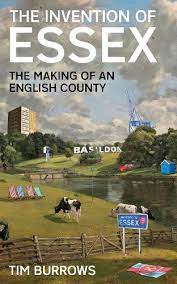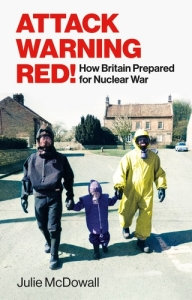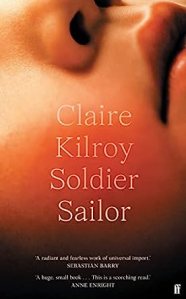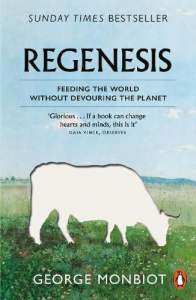July 15, 2024 · 9:13 am
I went to the Hay Festival for a couple of days at the end of May and picked up Regenesis by George Monbiot from the signed copies table in the Festival Bookshop (climate and food seemed to be big topics at the Festival this year). The first half of Monbiot’s book about the state of the food and farming industry is terrifying, with disturbing statistics about the impact of land use for farming livestock and evidence that some types of organic farming can actually be worse for the environment. Luckily, the second half is more positive with examples of how food production can be genuinely sustainable, although it feels like it would take a miracle for these methods to be widely adopted across society to make a difference. Monbiot has clearly been deeply immersed in his research on soil ecology, but also addresses social issues around food bank use, and he puts forward a persuasive case for reducing farming of animals for food.
 I recently saw a young woman in a bookshop in Essex looking at a copy of The Invention of Essex by Tim Burrows and declaring to her friend that “It’s all about how Essex became a country”. No, that’s not a typo, and no, she didn’t realise her mistake. Some might say this shows why the Essex stereotype exists, but Burrows explains that bias against the landscape and inhabitants of Essex is far from a new phenomenon. ‘The Invention of Essex’ is a book that could have offered a surface-level analysis about why parts of the county voted overwhelmingly for Leave in the 2016 referendum, but thankfully digs a bit deeper into the psyche of this unique part of the UK and how it has been shaped demographically over the years, most notably by people moving out from the East End of London. The book meanders thematically around the history and natural environment of Essex, mostly focusing on the south of the county (Burrows is from Southend and still lives there), and covering how it has become a literal dumping ground for everyone’s waste, as well as the rise of a certain Brentwood-based reality TV show. This is a thoughtfully written account – not nostalgic enough to be a love letter as such, but not without affection for some of the region’s lesser-known oddities either.
I recently saw a young woman in a bookshop in Essex looking at a copy of The Invention of Essex by Tim Burrows and declaring to her friend that “It’s all about how Essex became a country”. No, that’s not a typo, and no, she didn’t realise her mistake. Some might say this shows why the Essex stereotype exists, but Burrows explains that bias against the landscape and inhabitants of Essex is far from a new phenomenon. ‘The Invention of Essex’ is a book that could have offered a surface-level analysis about why parts of the county voted overwhelmingly for Leave in the 2016 referendum, but thankfully digs a bit deeper into the psyche of this unique part of the UK and how it has been shaped demographically over the years, most notably by people moving out from the East End of London. The book meanders thematically around the history and natural environment of Essex, mostly focusing on the south of the county (Burrows is from Southend and still lives there), and covering how it has become a literal dumping ground for everyone’s waste, as well as the rise of a certain Brentwood-based reality TV show. This is a thoughtfully written account – not nostalgic enough to be a love letter as such, but not without affection for some of the region’s lesser-known oddities either.
 Attack Warning Red! by Julie McDowall looks at Britain’s preparations for a nuclear attack during the Cold War. McDowall was traumatised as a child by the film ‘Threads’ first broadcast on the BBC in 1984 (if you’ve seen it, you’ll understand…) and the contents of this book won’t feel any more reassuring. Some early versions of the government’s emergency plans were optimistically based on capturing the Second World War’s “Blitz spirit” and seem wholly inadequate to the point of being laughable amid the collapse of civil society. They include pub landlords jumping on their bicycles and shouting “The Russians are coming!” as a four-minute warning for local residents, ice cream vans being used to transport medicines and prisoners being freed because incarceration would no longer be a punishment (one Home Office report also noted that psychopathy would be a useful trait in a crisis situation). ‘Attack Warning Red!’ is a uniquely farcical “what if?” look at history that never was, yet also quite chilling in that the plans were very much real even though they were never used.
Attack Warning Red! by Julie McDowall looks at Britain’s preparations for a nuclear attack during the Cold War. McDowall was traumatised as a child by the film ‘Threads’ first broadcast on the BBC in 1984 (if you’ve seen it, you’ll understand…) and the contents of this book won’t feel any more reassuring. Some early versions of the government’s emergency plans were optimistically based on capturing the Second World War’s “Blitz spirit” and seem wholly inadequate to the point of being laughable amid the collapse of civil society. They include pub landlords jumping on their bicycles and shouting “The Russians are coming!” as a four-minute warning for local residents, ice cream vans being used to transport medicines and prisoners being freed because incarceration would no longer be a punishment (one Home Office report also noted that psychopathy would be a useful trait in a crisis situation). ‘Attack Warning Red!’ is a uniquely farcical “what if?” look at history that never was, yet also quite chilling in that the plans were very much real even though they were never used.
 Soldier Sailor by Claire Kilroy is a novel about motherhood, a monologue from the perspective of ‘Soldier’ who is looking after her baby son ‘Sailor’. The narrative covers the mundane and repetitive tasks of feeding and nappy-changing, the heart-stopping terror when Sailor goes missing or injures himself and Soldier’s deteriorating relationship with her unsympathetic husband. I don’t always enjoy reading books written in a stream of consciousness style, but it fits well with the intense and immersive experience depicted here, in which emotions oscillate wildly between deadpan humour to abject fury. In the second half, Soldier meets a fellow caregiver to three young children and forms a bond with him. ‘Soldier Sailor’ is Kilroy’s first novel in ten years and an author who is new to me, but I have since picked up one of her other books second-hand and expect ‘Soldier Sailor’ could be in line for a Booker Prize longlisting on 1st August.
Soldier Sailor by Claire Kilroy is a novel about motherhood, a monologue from the perspective of ‘Soldier’ who is looking after her baby son ‘Sailor’. The narrative covers the mundane and repetitive tasks of feeding and nappy-changing, the heart-stopping terror when Sailor goes missing or injures himself and Soldier’s deteriorating relationship with her unsympathetic husband. I don’t always enjoy reading books written in a stream of consciousness style, but it fits well with the intense and immersive experience depicted here, in which emotions oscillate wildly between deadpan humour to abject fury. In the second half, Soldier meets a fellow caregiver to three young children and forms a bond with him. ‘Soldier Sailor’ is Kilroy’s first novel in ten years and an author who is new to me, but I have since picked up one of her other books second-hand and expect ‘Soldier Sailor’ could be in line for a Booker Prize longlisting on 1st August.
Filed under Books
